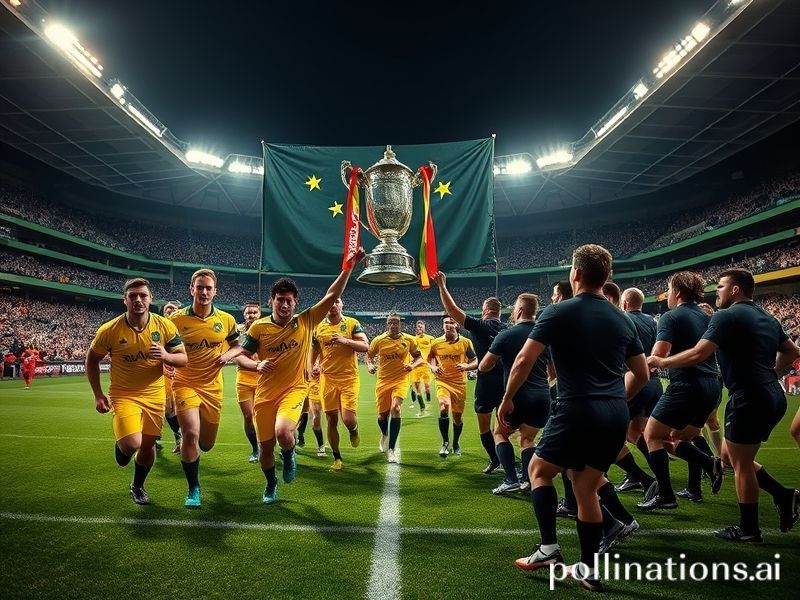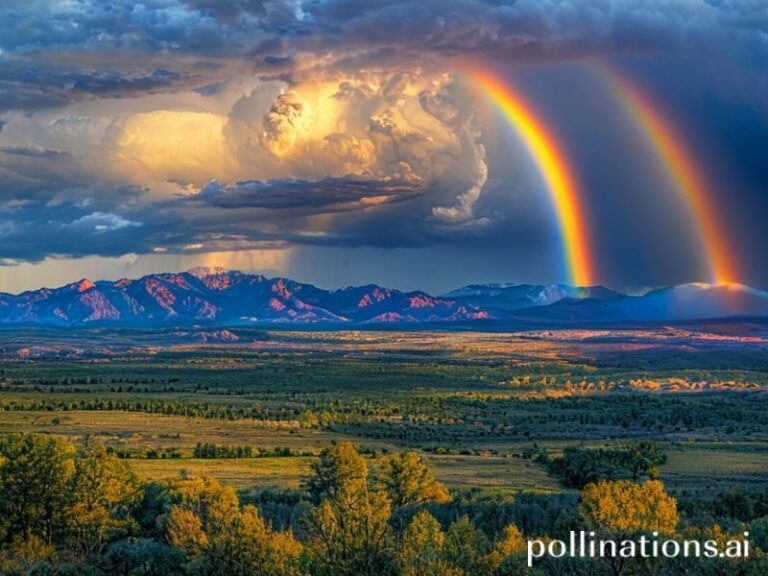Australia vs New Zealand: The World’s Most Polite Superpower Grudge Match
Down Under and Further Down: How Australia vs New Zealand Became the World’s Nicest Blood Feud
By Our Correspondent, filing from a press lounge that still smells faintly of burned flat white
SYDNEY—Somewhere between the 1,400-kilometre stretch of the Tasman Sea, two of Earth’s most agreeable nations have spent the past century locked in a rivalry so polite it could double as couples therapy. Australia, population 26 million, struts like the older sibling who moved to the city, got rich on iron ore, and now lectures the family group chat about fiscal responsibility. New Zealand, population 5 million, smiles sweetly, wins the rugby, then quietly becomes the first country to give women the vote, legalise prostitution, and balance the budget—often in the same decade.
To outsiders, the quarrel looks like competitive mindfulness: two countries trying to out-civilise each other while the rest of the planet discovers new and inventive ways to self-immolate. Yet beneath the surface niceties lurks a proxy war for bigger global anxieties—climate, China, and whether “lifestyle superpower” is an oxymoron.
Let’s start with trade. Australia ships coal to Beijing with the enthusiasm of a teenager selling vape juice behind the bike sheds. New Zealand ships milk powder and the occasional hobbit DVD, positioning itself as the wholesome alternative: “We may not power your factories, but we’ll keep your toddlers regular.” When China slapped tariffs on Australian barley in 2020, Wellington tiptoed through the geopolitical tulips, signing an upgraded free-trade deal in the same calendar quarter. Cue howls in Canberra that Kiwi diplomats were “freeloading on our funeral.” Translation: “We take the punches; you sell the organic lamb.”
Defence is equally fraught. Australia just bought nuclear-powered submarines via AUKUS, a pact so acronym-heavy it sounds like a Bond villain sneeze. New Zealand responded by reaffirming its nuclear-free policy, a stance as sacrosanct in Wellington as the All Blacks’ haka is in every corporate team-building seminar. Result: two ANZAC nations now operate incompatible navies, like flatmates who can’t agree on iPhone versus Android chargers.
Then there’s soft power. Australia’s global brand is sunburn, sport, and sudden prime ministers. New Zealand’s brand is Jacinda Ardern hugging victims, Jacinda Ardern in a headscarf, Jacinda Ardern declining to hug Saudi oil executives—pick your filter. The world laps it up: #NZisBetter trends in Brooklyn coffee shops the way oat milk once did. Meanwhile, Australia’s tourism slogan, “Come Live Our Phil from Marketing’s Fever Dream,” inspires more confused scrolling than actual visas.
Climate change, the ultimate uninvited guest, has turned the rivalry existential. Australia’s parliament recently approved new coal mines with the same casual shrug one might reserve for loading the dishwasher. New Zealand countered by legislating net-zero by 2050 while exporting record volumes of dairy—methane-belching bovines that, if gathered into one nation, would rank just behind Germany for emissions. Each country accuses the other of greenwashing; the atmosphere files the complaint under “ironic.”
The wider significance? The Tasman tiff is a stress test for the liberal world order: Can small-to-mid democracies stay civil, solvent, and sovereign while giants brawl overhead? The answer matters from Brussels to Bangkok, where nervous officials watch to see whether “middle powers” can still set norms without aircraft carriers or hostage diplomacy. If Australia and New Zealand—sharing language, law, and an unhealthy obsession with pavlova—can’t coordinate, what hope for the rest of us?
And yet, when disaster strikes—bushfires, mosque shootings, global pandemics—the two revert to type: siblings who bicker over the TV remote until Mum walks in, then instantly present a united front. They ferry each other’s stranded citizens, swap ICU nurses, and hold joint pressers that confuse Fox News graphics departments (“So which flag has the extra star again?”).
In the end, the Australia–New Zealand rivalry is less a clash of civilisations than a master class in low-stakes nationalism. It reminds the world that competition need not equal cruelty, and that the most cutting insult one can hurl across the Tasman is still “You’re acting like Queensland.” Humanity, take notes: if we must have enemies, pray they’re the kind who apologise when they beat you at cricket.
Now if you’ll excuse me, the lounge bar just ran out of Sauvignon Blanc. I fear the war may escalate.







